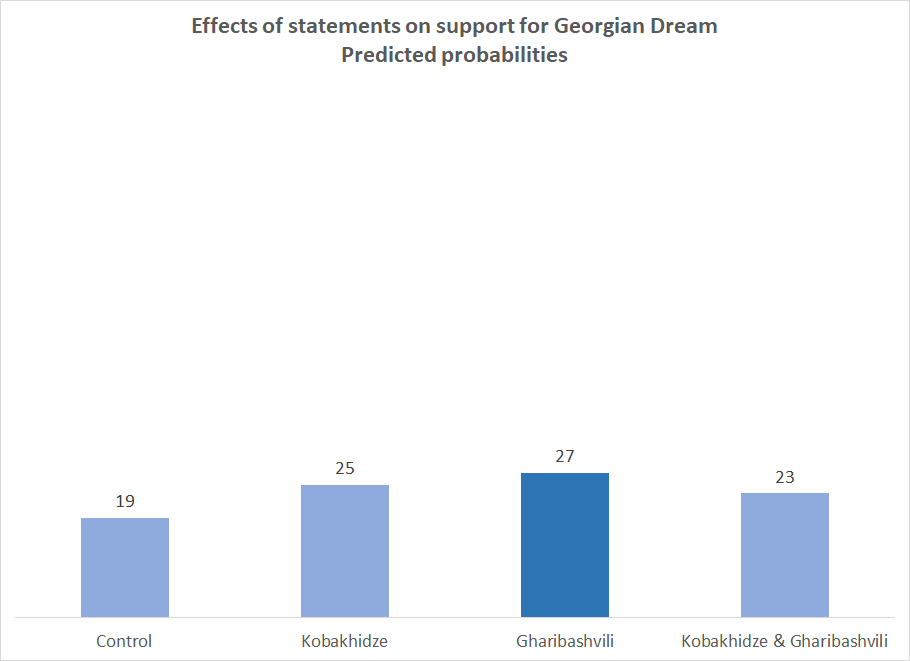
A CRRC Georgia study found that positioning Georgian Dream as more moderate than its spin-off group, People’s Power, increased support for the ruling party.
A popular study suggests that when a person goes for a date, they will be more liked if they take a similar, but slightly less attractive companion with them. Likewise, political parties often look better for their voters when they position themselves against a similar, but less appealing opponent.
This blog shows how the same principle works in Georgia, and how the ruling Georgian Dream party appears to be boosting its support by arguing with its ‘friendly rival’, the People’s Power movement.
In summer 2022, three Georgian Dream MPs announced that they were leaving the ruling party to ‘speak more freely’; in practice, this meant criticising the West, including ‘personal attacks’ on the US ambassador, and suggesting that the West wanted to drag Georgia into war.
More politicians later joined the three MPs, and established the Peoples’ Power movement. Its members remained in the parliamentary majority together with Georgian Dream, which raised questions as to whether People’s Power was a true opponent to Georgian Dream or just a satellite party, intended to advance the ruling party’s more radical policies and boost support amongst anti-Western groups within Georgia’s electorate.
The latter suspicions have been further strengthened by the ambiguous reaction of Georgian Dream’s leadership to the radical anti-Western statements from their new, ostensible opponents. While Irakli Kobakhidze, the ruling party chair, largely endorsed what People’s Power were saying, Prime Minister Irakli Gharibashvili spoke out against the statements, warning against potential damage to relations with the US.
Even more tellingly, when the foreign agent law was tabled by People’s Power, Georgian dream’s leading figures were quick to express their support for the bill, despite its ostensibly separate roots.
To investigate whether Georgian Dream could expect any benefit from its radical knock off party, CRRC Georgia designed and carried out a survey experiment in November 2022. We randomly split a sample of 1,219 respondents into four groups.
The first, a control group of respondents, were told that politicians from People’s Power had criticised the US ambassador and suggested that the US wanted to drag Georgia into the war in Ukraine.
The second group were told both the above and that Irakli Kobakhidze had issued a note not denying the statement.
The third group was told about People’s Power’s allegations, but added Irakli Gharibashvili’s comment that such statements would weaken Georgia’s relations with the US.
The fourth group was informed about all three statements: the original anti-Western statement from People’s Power, Irakli Kobakhidze’s note which did not contradict the statement, and the opposing comment by Irakli Gharibashvili.
Finally, all respondents were asked about whom they would vote for if elections were held tomorrow.
The data show that the comment that differentiated Georgian Dream from its supposed opponent was most beneficial to the ruling party.
The Prime Minister’s disagreement with the statement increased Georgian Dream’s expected support by eight percentage points: 19% of respondents voted for Georgian Dream on hearing only the anti-Western statement, but on exposure to Gharibashvili’s counter-statement, support for the party reached 27%.
Importantly, this share of the vote is in the population overall, rather than amongst those who would actually vote in an election, suggesting that the actual effect in an election could be much larger.

It is noteworthy that only the counterstatement on its own had a statistically significant effect: neither agreeing with the statement nor hearing both agreement and disagreement changed support for the ruling party in a statistically significant manner.
These findings are in line with similar studies from democracies and less democratic locales: radical spin-off parties tend to benefit the ruling party more than the party that splits off.
In this study, on average only 3% said they would support People’s Power across all scenarios. However, the impact of the statement was significant for the ruling party when they decided to appear less radical in comparison.
Notably, the experiment was conducted with a focus on the country’s Western orientation, which is a matter of national agreement: large majorities support Georgia joining the EU and NATO. It is not clear if the ruling party would still gain support from appearing to be the more attractive option in discussions of issues around which there is less consensus.
While this could have been tested out with the foreign agent law, ostensibly attributable to People’s Power, the ruling party has resolutely put its weight behind the law since its introduction. Whether Georgian Dream returns to positioning itself as more moderate than its spin-off group remains to be seen.
This article was written by Koba Turmanidze, President of CRRC Georgia. The views presented in the article are the author’s alone, and do not necessarily reflect the views of CRRC Georgia or any related entity.








